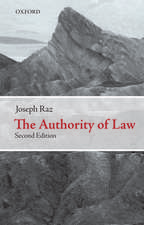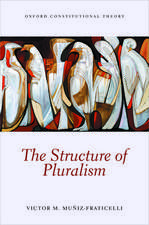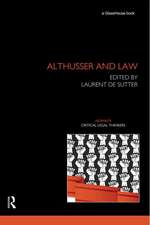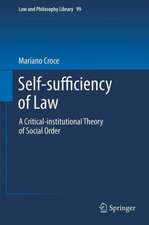The Legal Theory of Carl Schmitt
Autor Mariano Croce, Andrea Salvatoreen Limba Engleză Paperback – 28 mar 2014
| Toate formatele și edițiile | Preț | Express |
|---|---|---|
| Paperback (1) | 483.49 lei 6-8 săpt. | |
| Taylor & Francis – 28 mar 2014 | 483.49 lei 6-8 săpt. | |
| Hardback (1) | 1055.69 lei 6-8 săpt. | |
| Taylor & Francis – 10 sep 2012 | 1055.69 lei 6-8 săpt. |
Preț: 483.49 lei
Nou
Puncte Express: 725
Preț estimativ în valută:
92.53€ • 100.47$ • 77.72£
92.53€ • 100.47$ • 77.72£
Carte tipărită la comandă
Livrare economică 22 aprilie-06 mai
Preluare comenzi: 021 569.72.76
Specificații
ISBN-13: 9781138780842
ISBN-10: 1138780847
Pagini: 216
Dimensiuni: 156 x 234 x 15 mm
Greutate: 0.32 kg
Ediția:1
Editura: Taylor & Francis
Colecția Routledge
Locul publicării:Oxford, United Kingdom
ISBN-10: 1138780847
Pagini: 216
Dimensiuni: 156 x 234 x 15 mm
Greutate: 0.32 kg
Ediția:1
Editura: Taylor & Francis
Colecția Routledge
Locul publicării:Oxford, United Kingdom
Cuprins
Part 1: Concepts: decision, institutions and concrete order 1. The bumpy road to institutionalism: Schmitt’s way-out of decisionism 2. Exploring Schmitt’s institutionalism: institutions and normality 3. Institutionalist decisionism: law as the shelter of society 4. Institution and identity: reassessing Schmitt’s political theory Part 2: Oppositions: his "enemies" and "friends" 5. Schmitt vs. Kelsen: the social ontology of legal life 6. Schmitt vs. Hauriou: the politicization of institutionalism 7. Schmitt vs. Romano: institutionalism without pluralism? 8. Schmitt vs. Mortati: the concretization of the concrete order Part 3. Implications: Schmitt’s institutionalism and the current legal debate 9. The impossibility of legal indeterminacy 10. The inconceivability of legal pluralism
Recenzii
"Carl Schmitt is the most influential but for political reasons also most controversial German political theorist of the twentieth century. His influence reaches far beyond national borders and the field of jurisprudence. The literature on his work is endless. By now the political implications, all the way to the political theology, as well as the historical and biographical context have come under increasing attention. Thus, this book is a healthy provocation, since the authors understand Schmitt primarily as a theoretician of law. The core of his theory – contrary to the usual reduction on "decisionism" – is seen in his institutionalism and his concept of the concrete order. The attempt to view Schmitt’s entire work ‘through the lens of his institutional theory’ is a novelty. The authors move it – this is an unconventional view – into the proximity of H.L.A. Hart’s concept of legal standards."
Hasso Hofmann, Emeritus Professor of Constitutional Law and Legal Philosophy, Humboldt-Universität, Berlin
"Carl Schmitt was many things over the course of his long life: political theorist, theologian, intellectual historian, international lawyer, polemicist, opportunist, villain, antisemite, Roman Catholic, Nazi. However, first and foremost, Schmitt was a constitutional jurist. With The Legal Theory of Carl Schmitt, Mariano Croce and Andrea Salvatore present to an English-speaking audience for the first time a comprehensive account of Schmitt legal thinking from across his entire brilliant and controversial career. The authors trace Schmitt’s jurisprudence from its early neo-Kantian origins to its fully developed concrete institutionalism. With clarity and sophistication they examine Schmitt’s basic concepts and outline the many debates he engaged in with other prominent Staatsrecht predecessors and contemporaries. A great achievement and invaluable resource."
John P. McCormick, Professor of Political Science, University of Chicago.
"Ours is an intellectual history and ideation understood through the prism of the emerging practices studied in historical institutionalism.Conceptual puzzles are provoked by the indelible and enduring trace of Schmitt’s legal institutionalism. The lens of Schmitt’s institutional turn provides a spur."
-Richard R. Weiner, The European Legacy
Hasso Hofmann, Emeritus Professor of Constitutional Law and Legal Philosophy, Humboldt-Universität, Berlin
"Carl Schmitt was many things over the course of his long life: political theorist, theologian, intellectual historian, international lawyer, polemicist, opportunist, villain, antisemite, Roman Catholic, Nazi. However, first and foremost, Schmitt was a constitutional jurist. With The Legal Theory of Carl Schmitt, Mariano Croce and Andrea Salvatore present to an English-speaking audience for the first time a comprehensive account of Schmitt legal thinking from across his entire brilliant and controversial career. The authors trace Schmitt’s jurisprudence from its early neo-Kantian origins to its fully developed concrete institutionalism. With clarity and sophistication they examine Schmitt’s basic concepts and outline the many debates he engaged in with other prominent Staatsrecht predecessors and contemporaries. A great achievement and invaluable resource."
John P. McCormick, Professor of Political Science, University of Chicago.
"Ours is an intellectual history and ideation understood through the prism of the emerging practices studied in historical institutionalism.Conceptual puzzles are provoked by the indelible and enduring trace of Schmitt’s legal institutionalism. The lens of Schmitt’s institutional turn provides a spur."
-Richard R. Weiner, The European Legacy
Descriere
The Legal Theory of Carl Schmitt provides a detailed analysis of this thinker, who was so crucial to the development of Western legal thought.




















